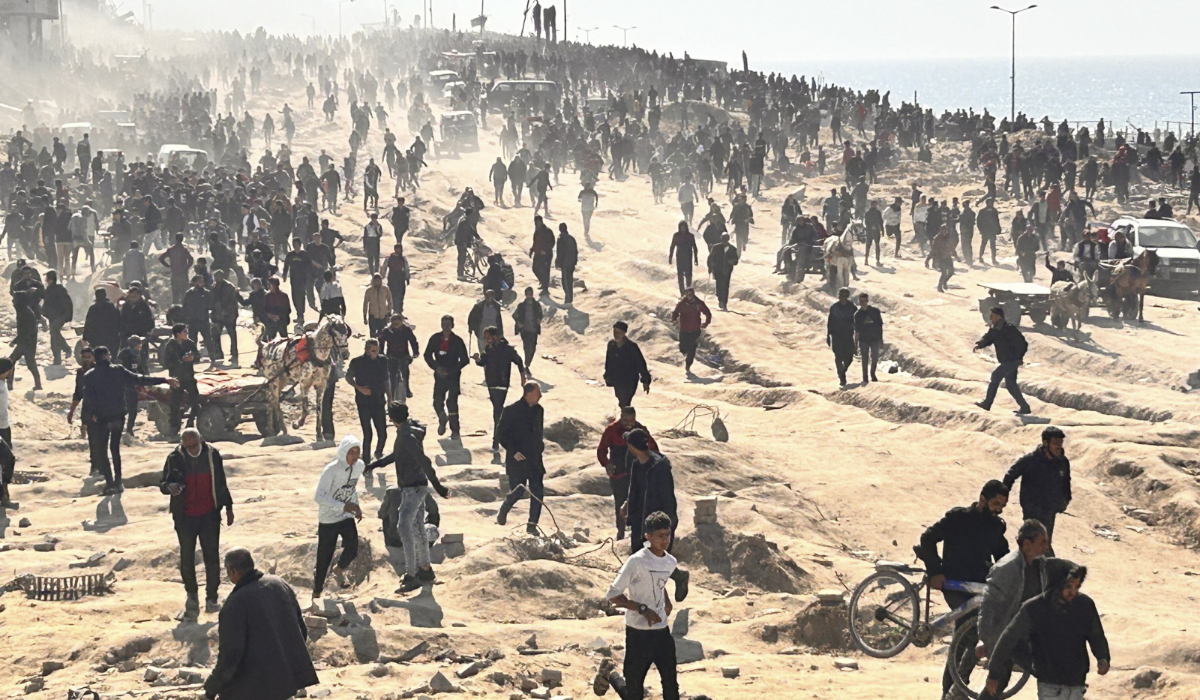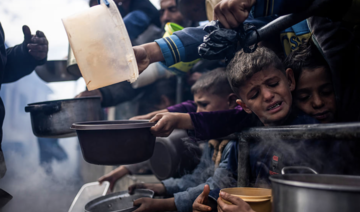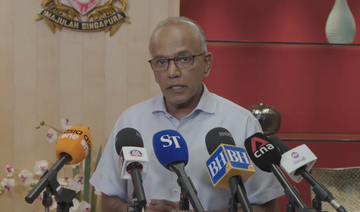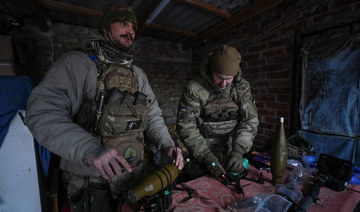NEW YORK CITY: The US on Tuesday urged Israel to ensure existing border crossings into Gaza remain open so that humanitarian aid can enter the territory, facilitate the opening of additional crossings to meet the growing humanitarian needs of Palestinians, and to support the rapid and safe delivery of relief supplies to vulnerable people throughout the enclave.
“Simply put, Israel must do more,” said Robert Wood, US alternate representative to the UN for special political affairs.
He also warned that any major Israeli ground incursion into the city of Rafah in southern Gaza, which has become the last refuge for more than a million Palestinian civilians who fled fighting in other parts of the territory, should not proceed “under the current circumstances.”
He added: “It is unconscionable that Hamas fighters continue to embed themselves among civilians and civilian infrastructure, including in hospitals and schools.”

Palestinians wait for humanitarian aid on a beachfront in Gaza City, Gaza Strip, Sunday, Feb. 25, 2024. (AP)
Wood vowed that the US will continue to engage in “intensive diplomacy” in its attempts to secure the release of Israeli hostages held by Hamas and enable an agreement for a “significant temporary ceasefire.”
He was speaking during a meeting of the UN Security Council to discuss the threat of starvation in Gaza. It was called by Guyana, which holds the rotating presidency of the council this month, with the support of Switzerland, Slovenia and Algeria.
Slovenia’s permanent representative to the UN, Samuel Zbogar, said: “Only an immediate and permanent ceasefire can avert the risk of famine.”
His country also calls for continuing safe, secure and unhindered humanitarian access to the entire Gaza Strip, he said, including the establishment of additional border crossings and simplified entry procedures for the delivery of aid supplies. He also called for the restoration of sufficient and safe water supplies, and for a ceasefire in the conflict between Israel and Hamas.
“There are times when we need to make choices and we need to prioritize,” Zbogar said. “Slovenia is choosing a ceasefire to prevent famine in Gaza, a ceasefire to provide relief to Palestinian people and to release hostages.”
Ramesh Rajasingham, the head of the UN’s humanitarian affairs office in Geneva and director of its coordination division, told the council that at least 576,000 people in Gaza, about a quarter of the population, are one step away from famine.
One in six children under the age of 2 years old in northern Gaza are suffering from acute malnutrition and wasting (a term used to describe low body weight relative to height), he added, and almost the entire population of the territory relies on “woefully inadequate” humanitarian food assistance to survive.
“If nothing is done, we fear widespread famine in Gaza is almost inevitable (and) the conflict will have many more victims,” Rajasingham said.
Maurizio Martina, deputy director of the UN’s Food and Agriculture Organization, told the council that Gaza has the highest percentage of people experiencing acute food insecurity the organization “has ever classified.”
Gaza’s food systems have been severely affected by the damage and destruction Israeli military operations have caused to civilian infrastructure, he said, including that which is essential for the production, processing and distribution of food, including farmland, irrigation, greenhouses and bakeries.
About 55 percent of land in Gaza used to grow crops has been damaged, Martina added, and other agricultural infrastructure has been devastated, with the greatest destruction affecting sheep farms, dairy farms, poultry farms, animal shelters and home barns. Meanwhile the capacity of bakeries to produce bread has been seriously hampered, and the commercial sector has been decimated as a result of a near-total lack of imports of essential items, including food.
The harvest of olives and citrus fruits, which provide an important source of income for many Palestinians, has been greatly affected by the hostilities as well, Martina added, while fodder shortages and the damage resulting from airstrikes have taken a toll on livestock, with many owners reporting substantial losses. All poultry used for breeding purposes has been slaughtered or died due to lack of feed and clean water, he said, as has up to 60 percent of calves and 70 percent of beef cattle.
Martina called for an immediate ceasefire as a prerequisite for preventing famine.
Carl Skau, the deputy executive director of the World Food Program, told council members that Gaza now has the worst level of child malnutrition seen anywhere in the world. He lamented the fact that the growing risk of famine is being fueled by the inability to get critical food supplies into the enclave in sufficient quantities, and the almost impossible operating conditions workers from his organization have to contend with in Gaza.
“WFP trucks face delays at checkpoints; they face gunfire; food was looted along the way; and at their destination they were overwhelmed by desperately hungry people,” Skau said.
“The breakdown in civil order, driven by sheer desperation, is preventing the safe distribution of aid.”
The WFP earlier announced it had paused the distribution of aid in the north of the territory.
“If nothing changes, a famine is imminent in northern Gaza,” Skau said. “We must all live up to our responsibilities to ensure it does not happen on our watch.”
Guyana’s permanent representative to the UN, Carolyn Rodrigues-Birkett, said the Security Council must take action to halt violations of international humanitarian law in Gaza, and called on all those with influence on the “perpetrators” of such actions to exert that influence to prevent further incidents.
Algeria’s permanent representative to the UN, Amar Bendjama. told fellow council members that Israel’s “deliberate use of starvation as a policy is a blatant violation of international law” and was intended to ensure Palestinians in Gaza “lose hope and dignity, and push them to violence and to the breakdown of law and order.”
The war in Gaza is not being waged on Hamas, he added, but is “collective punishment for Palestinian civilians.”
The Algerian envoy warned the council that “our silence grants a license to kill and starve the Palestinian population,” as he again called on the council to urgently demand a ceasefire.


























